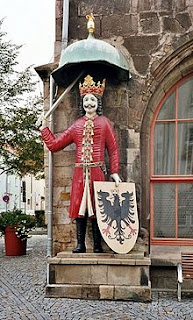Since
my family fled from East Germany in 1961, we celebrated June 17th as
a National Holiday or the Day of German Unity in West Germany. The day was marked with parades, concerts and
peaceful demonstrations to commemorate the Uprising of 1953. It was the only National Holiday in West
Germany since all other holidays are determined by the Bundesländer (states). After the Berlin Wall fell in 1989, the Day of German Unity was moved to
October 3rd in 1990.
Since
my family always believed in German unification we were very gladly celebrating
that holiday after we arrived in the GFR
(German Federal Republic). The first
year was the most dramatic since we had just arrived as refugees and still
lived in a camp in Űlzen with many other emigrants. I never will forget the exhilaration we all
felt when we sang for the first time the German National Anthem or the Song of Germany. It was composed by Joseph Hayden with words
by August Heinrich Hoffman: Unity and right and freedom for the German
Fatherland…. Those words alone brought
some kind of elation even for a 12-year-old.
My parents also were moved by the occasion, especially as they had
coordinated our escape under tremendous stress.
They
had planned a family vacation in the north of Berlin with the scheme of staying
in Rheinsberg for a few days and then leaving to Berlin instead of returning
to our hometown of Nordhausen. During those last few weeks before the
building of the Berlin Wall in 1961, thousands of refugees went through the camps in
Marienfelde (West-Berlin) and we ended up
there, too.
 The
uprising in 1953 started with a strike on June 16th by a few hundred
construction workers in Berlin who were told to take a pay-cut but still do the
same or even more work. That strike
spread like a wild fire throughout other cities. Suddenly, there were demonstrations everywhere
since the citizens did not want the ‘systematic implementation of Socialism.’ It alarmed the government of the GDR (German
Democratic Republic) and they brought in Russian Troops with tanks and police
to suppress the protests and some hundreds of Germans lost their lives during
the uprisings and the following incarcerations.
It was a troubled time for the young country which was under the suppressing
rule of the Soviet Union. The Soviet Union had never allowed East Germany to form an independent
or democratic government (GDR was only a fake name). The protesters
chanted: ‘Down with communism’ and ‘down with the government.’ The only way to silence the crowds was with
force which is always the case in totalitarian countries.
The
uprising in 1953 started with a strike on June 16th by a few hundred
construction workers in Berlin who were told to take a pay-cut but still do the
same or even more work. That strike
spread like a wild fire throughout other cities. Suddenly, there were demonstrations everywhere
since the citizens did not want the ‘systematic implementation of Socialism.’ It alarmed the government of the GDR (German
Democratic Republic) and they brought in Russian Troops with tanks and police
to suppress the protests and some hundreds of Germans lost their lives during
the uprisings and the following incarcerations.
It was a troubled time for the young country which was under the suppressing
rule of the Soviet Union. The Soviet Union had never allowed East Germany to form an independent
or democratic government (GDR was only a fake name). The protesters
chanted: ‘Down with communism’ and ‘down with the government.’ The only way to silence the crowds was with
force which is always the case in totalitarian countries.
Today
we celebrate June 17th as the birthday of our son Jason who was born
here in the USA in 1987. In my heart I
remember the brave men and women who risked their lives for freedom and the
rights for the greater good. It does not
matter which country we live in, all men want to be free and enjoy the liberty
to make their choices for their families, work and their social standings. In the end, that liberty can only be granted
when we reconnect ourselves with our creator and live our lives with our
God-given purpose. Anytime that autonomy
is threatened our original nature feels uneasy and wants to protest.























